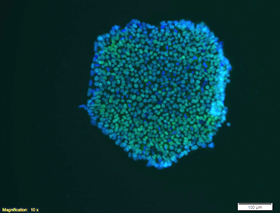 |
| Representative image courtesy of Dr. Elizabeth Buttermore, Boston Children’s Hospital.1 |
New induced pluripotent stem cell (iPSC) lines derived from patients with CDKL5 Deficiency Disorder (CDD) have been added to the Orphan Disease Center Collection in the CDKL5 BioRepository, housed at the Coriell Institute for Medical Research. The CDKL5 BioRepository contains iPSC samples from individuals with CDD, a rare neurodevelopmental disorder defined by epileptic seizures, developmental delay, intellectual disability, visual impairments, motor deficits, and sensory difficulties.
The four new female iPSC lines now available in the CDKL5 BioRepository include two isogenic controls where their unique CDKL5 variant (expressed in other iPSC lines available in the CDKL5 BioRepository) has been CRISPR-corrected to express wild-type CDKL5; and two associated cell lines which retain the original CDKL5 variant but have undergone the same experimental and culture conditions as their isogenic control lines. Thus, these lines represent passage-matched cell lines that are “CRISPR-not corrected” controls for the isogenic control lines.
ID Number | Collection | Family | CDKL5 Variant | Description |
OR00022 | CDKL5 BioRepository | 3563 | Wild-type | Isogenic Control |
OR00023 | CDKL5 BioRepository | 3563 | c.1412delA | CRISPR-not Corrected |
OR00024 | CDKL5 BioRepository | 3562 | Wild-type | Isogenic Control |
OR00025 | CDKL5 BioRepository | 3562 | c.1648C>T | CRISPR-not Corrected |
CDD is caused by mutations in the X-chromosome gene, CDKL5. The CDKL5 protein is critical for typical brain development. Perhaps due to the severity of the phenotypes in males hemizygous for a CDKL5 loss of function mutation, most (80-90%) of diagnosed CDD patients are females. However, male CDD cases have been reported. To date, the CDKL5 BioRepository contains wild-type and mutant CDKL5 iPSC lines derived from fibroblasts of female and male CDD individuals. The research community has used these cell lines to study molecular and cellular factors driving CDD biology in iPSC and iPSC-derived cells such as neural progenitor cells and neurons.
The Orphan Disease Center at the University of Pennsylvania and the Loulou Foundation, in collaboration with Coriell, formed the CDKL5 BioRepository in 2019 to establish and expand resources for biological and therapeutic research on CDD. The Loulou Foundation is a private nonprofit foundation dedicated to the development of therapeutics and eventual cures for CDD, and has partnered with the Orphan Disease Center at the University of Pennsylvania’s Perelman School of Medicine to create the CDKL5 Program of Excellence.
Financial Disclosure: The Orphan Disease Center at the University of Pennsylvania retains a licensed agreement with Coriell Institute of Medical Research to maintain CDD iPSC cell lines in the CDKL5 BioRepository.
1: CDKL5 iPSC colony expressing variant CDKL5 c.1412.delA (CDKL5 BioRepository Reference ID: OR00007). The iPSC colony is positive for DAPI (blue) and the pluripotent stem cell marker, Nanog (green). Image is captured at 10X magnification and scale bar represents 100 uM.
About the Coriell Institute for Medical Research
The Coriell Institute for Medical Research is a globally-recognized leader in biobanking and biomedical research. Coriell is home to one of the world's most important biobanks which distributes biological samples and offers research and biobanking services to scientists around the world. Coriell is the trusted steward of world-renowned collections for the National Institutes of Health, disease foundations and commercial clients. Also a leader in genomic and epigenomic research, Coriell is uncovering the ways our genetic makeup affects our health, especially with regard to cancer, aging, and personalized medicine. Coriell leads or participates in several research partnerships, including the Camden Cancer Research Center and the Camden Opioid Research Initiative. For more information, visit www.coriell.org, like Coriell on Facebook, or follow @Coriell_Science on Twitter.